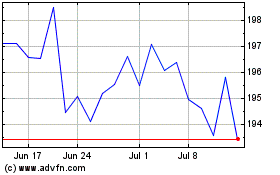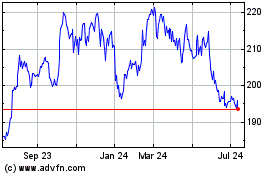2ndUPDATE: CME Looks To Sell Chicago Board Of Trade Building
June 13 2011 - 4:36PM
Dow Jones News
CHICAGO (Dow Jones)-- CME Group Inc. (CME) said Monday it is
looking to sell most of the Chicago Board of Trade building,
putting one of the city's most iconic structures on the market.
The disclosure comes less than a week after the exchange
operator warned it may leave Illinois to avoid an increase in
corporate taxes, though a CME spokesman said selling the Board of
Trade building isn't connected to discussions over a potential
move.
The sale of the Art Deco building would include some of the
trading-floor space where brokers bark out orders for corn and
wheat futures. CME plans to lease back the floor space and continue
to operate those trading pits, yet veteran traders saw the
announcement as another sign of the growing move to electronic
trading.
CME said it hired Jones Lang LaSalle Inc. (JLL) and Holly Duran
Real Estate Partners LLC to market the north and south towers of
the 80-year-old structure, which is topped by a three-story statue
of Ceres, the Roman goddess of agriculture and grain. CME will
retain ownership of the building's east tower, home to its
financial futures markets.
Jamie Parisi, CME's chief financial officer, said in a statement
that exiting the real estate business would free up capital for the
exchange operator to reinvest in its core derivatives business.
Analysts saw the announcement as a chance for CME to cash in on a
recovery in corporate real estate.
"We've seen the price per square foot of trophy properties
improve over last year and a half, and it could be that CME's
looking to monetize that," said Michael Larson, a real estate and
interest-rate analyst with Weiss Research. "The question is whether
they may be a little too late, if the economy's starting to slump a
bit again."
In Chicago, the owners of the Willis Tower -- formerly known as
the Sears Tower -- recently began seeking investors to buy all or a
portion of the country's tallest skyscraper. Hines Interests has
been looking to sell off a stake of a 50-story office building,
known as the UBS Tower.
Brian Nagel, executive vice president for commercial real estate
services company Colliers International in Chicago, estimates CME
could sell the 1.4 million square feet for about $150 square foot,
or about $210 million. He said the buyer is likely to be a domestic
investment group, such as a pension fund or real estate investment
trust.
As part of any deal, the CME said it will aim to secure a
15-year lease on the sale of the facilities it currently uses, and
reiterated its commitment to open-outcry trading, which accounted
for about 20% of the 3.1 billion futures and options traded on its
markets last year.
Over the last decade, the parent of the Chicago Mercantile
Exchange has ridden the wave of automation sweeping financial
markets, helping to achieve rapid growth in its trading volumes and
fueling the acquisition of rivals, including the Chicago Board of
Trade in 2007 and New York Mercantile Exchange in 2008. Last summer
CME opened a new data center facility in the Chicago suburb of
Aurora, Ill., built to house its trade-matching systems as well as
the servers of computer-powered trading firms that rank among its
busiest customers.
Floor traders, who aren't authorized to speak with media by
their employers, said the building going up for sale reinforced a
long-held belief that the exchange wants to phase out open-outcry
trading, which accounts for less than 15% of the volume in the
grain markets right now. They noted the plan for a 15-year lease
for the space housing the trading floors was relatively short and
expect CME to take aggressive action to diminish the role of the
floor starting next summer. In July 2012, an agreement requiring
the exchange to consult former members on trading procedures
expires.
A CME spokeswoman said the company remains committed to floor
trading as long as demand for it remains.
CME became a property owner through its deals for CBOT and
Nymex. According to regulatory filings, the company reported a net
property value of $786.8 million at the end of 2010, up from the
$707.2 million in value estimated for 2008. A spokeswoman for CME
said the company isn't planning a sale of the Nymex building in New
York City.
A representative for CME also downplayed any connection between
the planned sale and any potential move of the corporate home of
the world's largest futures exchange operator from Chicago, raised
by CME Executive Chairman Terry Duffy last week at the company's
annual shareholder meeting.
Duffy said he and Parisi had been examining the possibility of
relocating CME's corporate base outside Illinois, after the state
in January sharply raised the corporate tax rate as part of efforts
to put its finances in order.
CME leaders said they remain concerned about the tax issue, but
want to stay in Chicago.
A group of about 25 protesters gathered outside CME Group's
Chicago headquarters a few blocks from the Board of Trade building
Monday. They decried the company's complaints about state taxes and
its warnings about potentially exiting Illinois.
-By Jacob Bunge and Howard Packowitz, Dow Jones Newswires;
312-750-4117; jacob.bunge@dowjones.com
(Eliot Brown, Bob Tita, Andrew Johnson Jr. and Tom Polansek
contributed to this article.)
CME (NASDAQ:CME)
Historical Stock Chart
From May 2024 to Jun 2024

CME (NASDAQ:CME)
Historical Stock Chart
From Jun 2023 to Jun 2024
